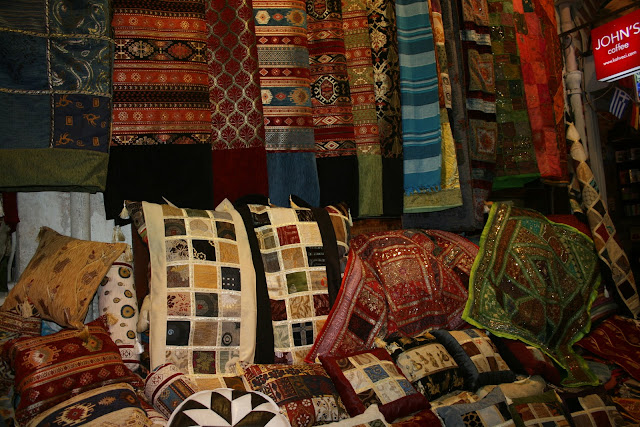We couldn't take any pictures inside but it was amazing. I think it is one of the most beautiful and ornate palaces I have ever visited. The chandeliers were magnificent! I did find some pictures online.
Sneaking a photo through the doors.
Built on orders of the Ottoman Sultan Abdulaziz (1861-1876), it's a delightful, if ornate, imperial residence with a fountain in the main salon, the usual sumptuous chambers, Bohemian crystal chandeliers, Sèvres and Chinese vases, and pleasant gardens.
The palace looks its most attractive from the Bosphorus, photo taken yesterday from river cruise,
Its two bathing pavilions, one for the harem (women's only) and the other for the selamlik (men's only), can best be seen.
Quite foggy as we started out.
One of the most attractive rooms is the reception hall, which has a pool and fountain. Running water was popular in Ottoman houses for its pleasant sound and cooling effect in the heat.
Egyptian reed matting is used on the floor as a form of insulation. The crystal chandeliers are mostly French Baccarat and the carpets are from Hereke.
The palace was often used as a guest house for visiting royalty. Empress Eugénie of France, Shah Nasruddin of Persia, Grand Duke Nicholas of Russia and other worthies enjoyed its comforts.
Sultan Abdulhamid II was deposed by the Young Turks in 1909, and spent the last years of his life (1913-1918) under house arrest at Beylerbeyi.
Much of the furniture in the palace was made by the sultan himself, who was an accomplished cabinet-maker.
It is not as foggy now as we crossed the Bosphorus Bridge to the Asian side.
Obviously the views are very good.
This sightseeing is thirsty business. Time for a tea break on Camlica Hill. This tearoom was just beautiful.
Time to head back to Europe.
We're stuck in traffic on our way to lunch so we amuse ourselves taking pictures.
Lunch
The restaurant was selected by the tour guide and our meal was included in the tour price. It was excellent, service was friendly and helpful.
Fish
Hagia Sophia (from the Greek: Ἁγία Σοφία, "Holy Wisdom"; Latin: Sancta Sophia or Sancta Sapientia; Turkish: Aya Sofya) is a former Orthodox patriarchal basilica, later a mosque, and now a museum. From the date of its dedication in 360 until 1453, it served as the cathedral of Constantinople, except between 1204 and 1261, when it was converted to a Roman Catholic cathedral under the Latin Patriarch of Constantinople of the Western Crusader established Latin Empire. The building was a mosque from 29 May 1453 until 1934, when it was secularized. It was opened as a museum on 1 February 1935.
Then it's time to head to the Grand Bazaar.
Oh, if only, I had room in our luggage to shop! I did buy a couple of cushion covers.
Then it was a quick stop at a leather factory at the group's (not ours) request. However, the prices were high and none of our group bought anything.
It was time to say good bye to the group as we were all leaving at different times the next day.
The 4 of us went out for a quick bite and just as we got seated for a drink the rain and wind started.
We then went for a quick bite around the corner from the hotel and to bed for our long trip home.


















































No comments:
Post a Comment
This blog does not allow anonymous comments.